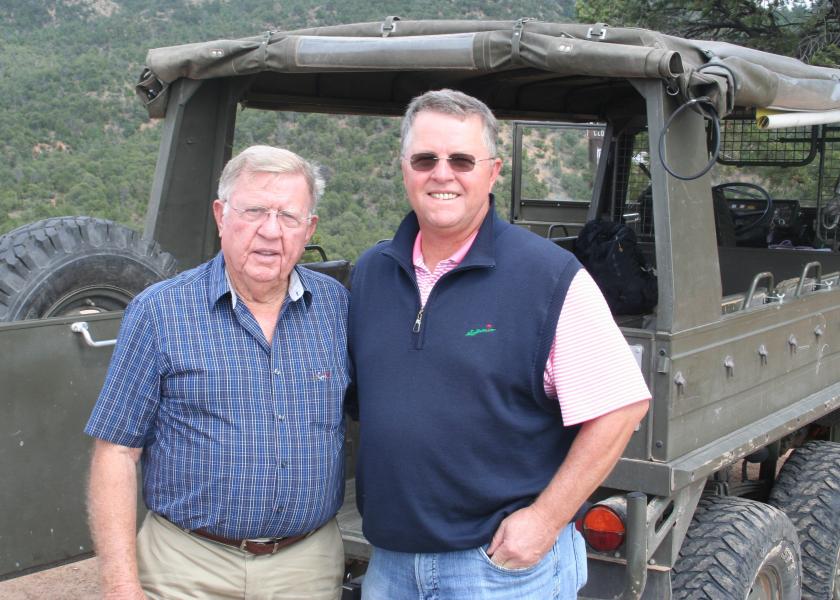PORK Perspectives: A Minute with David Herring, Page 2

Continued from page 1
Q. What are the greatest opportunities in the swine industry today?
A. Our greatest opportunities will always be our biggest problems. You have to look at your problems and turn those into opportunities. Definitely today, one of our biggest obstacles is our labor demands or labor deficiencies. I think we need to address that head on. Agriculture has changed tremendously in the last 100 years. Think about it: 50% of the people in this country worked on the farm 80 years ago. Today, we've got 1.7% working on the farm and that's due to mechanization. The pork industry is going to have to get more automated and more mechanized.
Also, we've seen flat pork consumption in this country for the last 10 years. I think we need to learn more about what our consumer wants and design products that are more desirable to them. I see it in other proteins, but pork is not leading the race in product innovation. The lifestyle today is so busy and people do not want to spend a lot of time preparing food. I think this presents a great opportunity for the pork industry to increase pork consumption through new innovation.
Q. What do you think the pork industry needs to do to build up its labor force?
A. We have to expose future leaders and employees to what we do and help them understand it better. Hog Slat runs a summer internship program where we offer 30 to 35 internships every summer. Although I can’t tell you exactly what our retainage has been, it’s been pretty high. Too often, we are so busy on the farms that we don’t recruit or interact with the potential work force or expose them to opportunities in agriculture, specifically in pork. We have to do a better job of that going forward. I think you can go to a university or further education and they can teach you to think, but they can’t teach you how to work. The only way you can learn how to work is by working. A lot of potential employees or students that might entertain working in agriculture or in a pork facility, don’t really know about it so we have to open their eyes and explain what we do. It’s a great way of life with great opportunities and well-paying jobs.

During his role as president of the National Pork Producers Council, Herring enjoyed the opportunity to speak on behalf of U.S. pork producers.
Q. What’s the best piece of advice you’ve received?
A. In the late 1980s, I had the opportunity to build a DeKalb pig farm in Oklahoma and met the founder, Mr. Roy Poage. One day, he asked me a question. He said, “David, could you describe the perfect market hog?” And I'm thinking, “O.K., he's got 0.8 of backfat and he weighs 260 pounds.” I gave Mr. Roy my description and he said, “That's a good description, but the perfect market hog has never been produced. And it never will. We’ll always be getting better and better.” I never forgot that. I took that as you strive to be better and better every day. I've used that mantra in our business ever since.
Q. What will the business look like 20 years from now?
A. I don’t think the business will change a lot in the next 20 years, but we need to learn how to do more with less. We need to learn how to take things that we consider negatives and turn them into positives. We manage our business on a cost basis, so we will have to dig in and figure out more ways to be cost-effective. I’m very bullish on the next 20 years for the pork industry. I think pork is a great product – people love consuming pork, especially bacon. We have the inputs and the technology to produce pork as efficiently as anyone in the world and I don’t see anything changing there. Unless we have unforeseen hurdles to cross, we should be able to sustain what we are doing. I think the business is very capital intensive, however, and will keep consolidating. I’m not saying that’s what I want it to do, but I think the more efficient producers who strive to be innovative will keep growing in the business while the ones who are not keeping up with technology will probably end up in another business.

Herring (left) meets with Secretary of Agriculture Sonny Perdue to discuss the pork industry.
Q. How do you think COVID-19 will impact the future of the pork industry?
A. COVID-19 has exposed the weakest links in the food chain. We have to address those areas and implement as many fail safes as we can economically afford. For true food security going forward, we’re going to have to create more flexibility in the cold chain, on the farm and in the harvest plants. It will cost us some economic efficiencies, but I think it’s probably the safest thing to do going forward.
Q. What do you enjoy most about your job?
A. That's easy – it’s the people. I love the interaction with employees and customers. I really enjoy getting out and meeting different customers and going to the construction sites and meeting all the employees. I don't think you have to have a doctor in front of your name to be a professional. That guy who is swinging a hammer every day is just as much a professional as a surgeon is in my book.

Herring and his wife Lisa with their dog, Charlie. The Herrings have three children: Magdalene, Mary Ellen and William.
Q. If you could go back and do something differently in your career, what would it be and why?
A. There are always things you would like to change about your life, but I truly tried to make the best decisions I could every day throughout my career with the experience and knowledge I had at those times. I really don’t have any regrets and I wouldn’t want to change anything. I was fortunate to grow up with great parents, was lucky to marry a beautiful bride who has traveled all over the U.S. with me and is still my partner today, and I have a beautiful family.
Q. What advice do you have for someone who might like to do what you do someday?
A. Be flexible and don’t shy away from a challenge, take it head on. If you want to own your own business, have at it. You’ll have to put forth more than a 40-hour-a-week commitment. Understand there's going to be a lot of downs with some ups. But I'm a firm believer that people can do anything they want if they put their mind to it. I have enjoyed the last 40+ years that I've been able to work in this industry. I think it's a great life and a great opportunity for many young people.
Read more:







